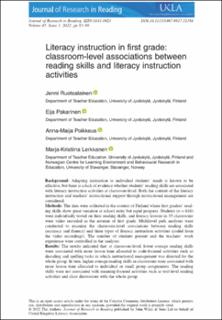| dc.contributor.author | Ruotsalainen, Jenni | |
| dc.contributor.author | Pakarinen, Eija | |
| dc.contributor.author | Poikkeus, Anna-Maija | |
| dc.contributor.author | Lerkkanen, Marja-Kristiina | |
| dc.date.accessioned | 2022-05-30T08:47:52Z | |
| dc.date.available | 2022-05-30T08:47:52Z | |
| dc.date.created | 2022-05-19T13:42:18Z | |
| dc.date.issued | 2022-02 | |
| dc.identifier.citation | Ruotsalainen, J., Pakarinen, E., Poikkeus, A-M., Lerkkanen, M-K. (2022) Literacy instruction in first grade: classroom-level associations between reading skills and literacy instruction activities. Journal of Research in Reading, 45 (1), 83-99. | en_US |
| dc.identifier.issn | 0141-0423 | |
| dc.identifier.uri | https://hdl.handle.net/11250/2996675 | |
| dc.description.abstract | Background
Adapting instruction to individual students' needs is known to be effective, but there is a lack of evidence whether students' reading skills are associated with literacy instruction activities at classroom-level. Both the content of the literacy instruction and teachers' instructional support through instructional management are considered.
Methods
The data were collected in the context of Finland where first graders' reading skills show great variation at school entry but rapid progress. Students (n = 616) were individually tested on their reading skills, and literacy lessons in 35 classrooms were video recorded in the autumn of first grade. Multilevel path analyses were conducted to examine the classroom-level associations between reading skills (accuracy and fluency) and three types of literacy instruction activities (coded from the video recordings). The number of students present and the teachers' work experience were controlled in the analyses.
Results
The results indicated that, at classroom-level, lower average reading skills were associated with more lesson time allocated to code-focused activities such as decoding and spelling tasks in which instructional management was directed for the whole group. In turn, higher average reading skills in classrooms were associated with more lesson time allocated to individual or small group assignments. The reading skills were not associated with meaning-focused activities such as text-level reading activities and class discussions with the whole group.
Conclusions
In early literacy lessons, students' reading skills were associated with teachers' implementation of different literacy instruction activities at classroom-level. In classrooms with more students having already acquired basic decoding skills, teachers provided more classroom time for independent practice and individual support, which is likely to support consolidation of students' literacy skills. | en_US |
| dc.language.iso | eng | en_US |
| dc.publisher | John Wiley & Sons Ltd on behalf of United Kingdom Literacy Association. | en_US |
| dc.rights | Navngivelse 4.0 Internasjonal | * |
| dc.rights.uri | http://creativecommons.org/licenses/by/4.0/deed.no | * |
| dc.subject | lesevitenskap | en_US |
| dc.subject | literacy | en_US |
| dc.title | Literacy instruction in first grade: classroom-level associations between reading skills and literacy instruction activities | en_US |
| dc.type | Peer reviewed | en_US |
| dc.type | Journal article | en_US |
| dc.description.version | publishedVersion | en_US |
| dc.rights.holder | © 2022 The Authors. | en_US |
| dc.subject.nsi | VDP::Humaniora: 000 | en_US |
| dc.source.pagenumber | 83-99 | en_US |
| dc.source.volume | 45 | en_US |
| dc.source.journal | Journal of Research in Reading | en_US |
| dc.source.issue | 1 | en_US |
| dc.identifier.doi | 10.1111/1467-9817.12384 | |
| dc.identifier.cristin | 2025664 | |
| cristin.ispublished | true | |
| cristin.fulltext | original | |
| cristin.qualitycode | 2 | |

